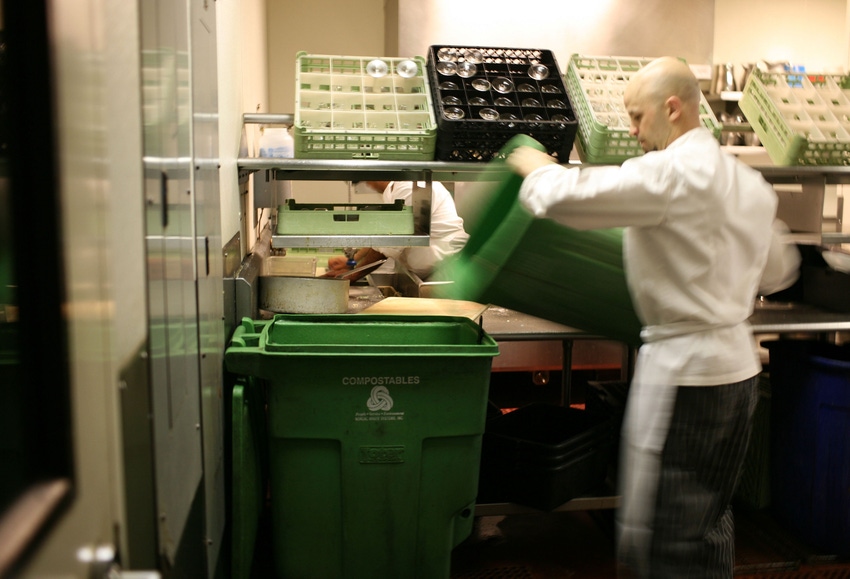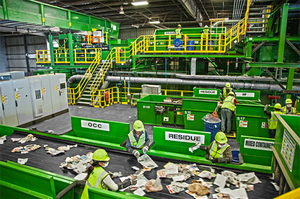More residents may be participating in backyard composting efforts in rural areas rather than dropping food waste at transfer stations.

The law requiring Vermont’s transfer stations to accept food waste went into effect July 1. While some officials have said participation has been slow at some transfer facilities, state and regional Vermont recycling leaders remain optimistic about the long-term prospects for the program.
In fact, they say, food waste is being collected and managed ahead of a 2020 mandate requiring all food waste be diverted from landfill. In addition, more residents may be participating in backyard composting efforts in rural areas, which would explain a slower start to participation in drop-off programs. Regardless, officials think it’s still early days for the programs and expect participation to ramp up in the coming months and years.
Vermont’s Universal Recycling Law (Act 148), which passed in 2012, set a 2017 deadline for transfer stations accepting MSW to also offer food residuals collection. Phased in over time, the law bans from waste bins: recyclables in 2015, leaf and yard debris in 2016 and food scraps by 2020.
“The reason why the law was passed was we wanted to decrease the amount of waste disposed. So we are going in the direction of the goal of the law as far as throwing away less material,” says Cathy Jamieson, solid waste program manager for the Vermont Department of Environmental Conservation. Two-thirds of the food wasted in Vermont is from residential sources, she adds.
“So if we don’t target the residential sector, we’re not going to capture the majority of food waste disposed in Vermont,” Jamieson says.
So far, the results have been promising. From 2014 to 2015, Vermont had a 5 percent drop in MSW disposal and from 2015 to 2016 it experienced another 3.5 percent drop, according to Jamieson.
While the state can’t gauge how much is organics driven and how much is recyclables at this point, but there are some indicators it does have, she says. Vermont’s recycling rate increased 3 percent during that same two-year period, says Jamieson, at a time when other states have experienced decreases in recycling tonnage.
In 2015, there was a 15 percent increase in the amount of material going to composting facilities and the amount of wasted food now going to food rescue and food banks has increased more than 40 percent, she adds.
“So the law is working,” Jamieson says.
And Vermonters are handling food residuals.
“Unlike recycling, people can manage their food waste at home. You can’t really backyard recycle, but you can backyard compost,” she says.
Backyard composting is a more viable option for some people.
Jonny Finity, marketing and communications manager for the Chittenden, Vt., Solid Waste Department, says Chittenden County has had a food waste program since 2001 that has seen increased food collection each year.
In 2001, facilities collected 42 tons of food scraps. In 2016, they collected 743 tons.
“So we’ve seen tremendous growth in the number of people dropping off food scraps,” says Finity.
In the densely-populated Chittendon County, people are more interested in finding an alternative to backyard composting, which is why they use the drop-off centers, he says. In more rural areas, they are more likely to go with backyard composting.
“I think in some of the rural counties of Vermont, where drop-off composting hasn’t been an option, up until a month ago, participation rates may be slow to catch on,” he says. “But we expect to see large growth in the numbers of people participating in the program in the coming months and years leading up to 2020.”
Either way, Finity says, people are talking about the law more and asking what to do for the coming ban on food scraps.
Chittendon County has built an environment for taking responsibility for its own waste, he says.
“People have been hugely supportive in our community of this facility, and of food scrap drop-off collection in general,” he says. “We also offer backyard composting seminars that fill up regularly. That’s kind of the silent partner of the drop off stations.”
The Central Vermont Solid Waste Management District is a 19-member municipality with two cities and 17 towns, where it is a brand new concept to bring food waste to transfer stations.
“Most people we talk to are already backyard composting or diverting their food waste in some way,” says Cassandra Hemenway, outreach manager for the district. “So it is taking a while to start up, but it’s only been a month and a half.”
Backyard composting may be less inviting in the cold Vermont winter, and transfer station drop-off may see more participation in those months, says Hemenway.
“My understanding of the goal of putting the food scrap collection at transfer stations into place in 2017 wasn’t to immediately have 50 percent of the population bringing food scraps to transfer stations,” she adds. “My understanding was that starting it now in 2017 was a way to slowly build the groundwork for 2020 when residential food scraps are banned from landfill.
Mary T. O’Brien, recycling coordinator for the Southern Windsor/Windham Counties Solid Waste Management District, says all five transfer stations in that district are accepting food waste.
“I think right now the word is slowly getting out and people are starting to take advantage of it,” O’Brien says. “I think what’s more popular now in our area, because it’s rural, is backyard composting.”
The district has offered several backyard composting workshops and offered half-price backyard composters to attendees.
About the Author(s)
You May Also Like


